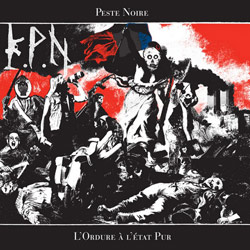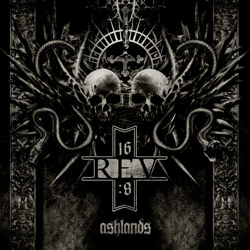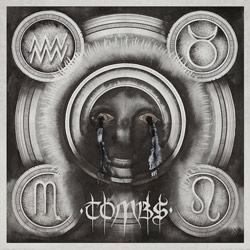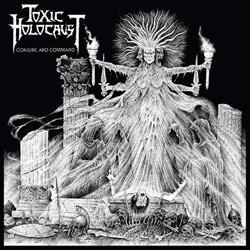
Le Secret ep
Prophecy
Alcest is a French band that gets categorized as part of the “shoegazer” black metal movement, as inspired by fellow countrymen Blut Aus Nord (see accompanying review below). Unlike Blut Aus Nord, Alcest, in my opinion, truly makes music worthy of the shoegaze tag. This new release, Le Secret, is actually a re-recording of an earlier two-song EP that the then one-man band released in 2005 bearing the same title. It begins with the 13-minute-plus title track, which starts off with a plaintive riff that wouldn’t sound out of place on a Slowdive or Cocteau Twins album. The song slowly swells with bright and distorted tremolo-picked chords and speedy drum work accompanied by muted vocals that sound like the product of a woman, but are actually courtesy of the man who founded Alcest, Neige. This swell is like the effect of when a hit of ecstasy kicks in: it builds upon dreamy, rolling feelings of romanticism and wide-eyed wonder before continuing to pick up pace and run out in a wash out on a similarly reverbed riff as began the song. The companion song, “Elevation”, is yet another epic-length track, beginning with spooky synths before building to a thrash-worthy, tremolo-picked wave of guitars and drums. Alcest’s music utilizes the trademarks of black metal to create music that ultimately defies the intentions of the genre. Where most show and affinity for darkness, death, and general negativity, Alcest is uplifting and life-affirming, which may seem counterintuitive, but I personally love the idea of taking established music sub-genres to places they’ve never been before. And if that’s not enough, the original two-song EP is also included in this package for good measure.

Forbidden Gates Beyond
Prosthetic
Anyone who says that there isn’t a good deal of quality death metal being created in the United States must have their head up their Scandinavian asshole. Chicago’s Black September and their new album, Forbidden Gates Beyond, are a sterling example of American output. Forbidden sticks to a quick pace, with the combination of punchy double-bass drum and jittery guitar riffs put further over the top by the scratchy rasp of vocalist Jen Pickett, which I wouldn’t have picked as being from a woman hadn’t I known already. No keyboards or operatics to be found here, just raw, gut-churning with shades of Mayhem and Watain. This is Black September’s first full-length so I will be looking forward to hearing whatever they do next.

777 Sect(s)
Season of Mist
I know this album has been out for a while, but better late than never, right? France’s Blut Aus Nord has been exceptionally prolific within the last few years, releasing more records in two years than most bands release in five year’s time. BAN is perhaps most famous for its avant garde atmospheric take on black metal, as captured on their ambitious concept record, The Work Which Transforms God from 2003. That landmark record transcended the limits of the original genre and in turn birthed the shoegaze black metal sub-genre. But in recent years, the group, which has seemingly settled into a permanent line-up, has grown traditional, implementing a lot more tremolo-picking and blast beats. BAN’s most recent LP, 777 Sect(s), continues this trend with a solid hour of sickly bent guitar riffs bordering on the brink of nausea, a mix of industrialized drum machine and jackhammer live drumming, ominous keyboards, indiscernibly buried vocals, background vocal chants, and an overall pall of grim bleakness. The dominance of the drum work, in particular, lends the record a mechanized and soulless feel, while on the other hand, there is plenty of complex songwriting and progressive playing in alien time signatures to keep things interesting.

Iron Dawn ep
Regain
I’d like to think that everyone reading this column at least recognizes the name Marduk. After all, they are one of the best known bands from the essential early-90s, second wave of black metal and are still alive and kicking in the year 2011. Still, with the exception of their 1999 landmark Panzer Division Marduk, most of their albums aren’t absolutely essential.
Enter Iron Dawn, a three-song song EP created seemingly for the sole purpose of having new merch to sell on Marduk’s 2011 summer tour of the States. On the cover is an army tank similar to the one found on the cover of Panzer Division, and fittingly the first two tracks harken back to that record, with sirens, cannons booming, rapidfire blast beats, machine gun churning guitars, and bombing sound effects alongside the gnarly, deep-throated grunting for which vocalist Mortuus is now famous. However, the last track on the disc, “Prochorovka: Blood and Sunflowers,” has more in common with the slower, scarier music that Marduk has exhibited on recent works like Wormwood and Rom 5:12. The song begins with some German music that sounds like it was lifted from a 1940s radio broadcast, while bombs explode in the background. The actual song eventually kicks in, but it creeps along slow and steady, creating a sense of dread not usually associated with Marduk’s body of work at large. It is eerie and effective, and musically probably the most interesting track on the disc. I like Iron Dawn a lot, and maybe the reason is that it is short and to the point, something that can’t be said about most of their recent output. Quantity rarely outshines quality, and Iron Dawn is certainly a quality feather in Marduk’s corroded hat.

L’Ordure à l’état Pur
Transcendental Creations
Calling France’s Peste Noire an experimental black metal band is quite the understatement. In fact, while there are some tremolo-picked riffs scattered throughout their fourth full-length album, L’Ordure à l’état Pur, this band can hardly be quarantined to any specific niche.
So where to begin with this monstrosity of an album? The confounding begins with the very first track, “Casse, Pêches, Fractures et Traditions,” which starts off with acoustic guitar layered over with impassioned French rambling. The song ebbs and flows in intensity over the course of its 10-minute duration, with elements like trombone being added before morphing into a guitar-driven waltz complete with an accordion solo. As the song ends, their metallic leanings come back into play as it erupts into a double-time breakdown that almost sounds like something off a ska-punk album. The ADD continues elsewhere on the album with trip-hoppy drum machine beats, operatic female vocals, sound effects (birds, gun loading). Timpani, and who knows what else. There are moments of straightforward metal here and there, particularly on “Sale Famine Von Valfoutre” and the doom-laden closer “La condi hu,” and don’t get it twisted, L’Ordure à l’état Pur isn’t a mere mash-up of chaos. The songs, most of which clock in around the 10-minute mark, all play like mini-symphonies, with each going through different musical phases that when put together come off like a complete thought, which is something that can’t be said about most metal epics. Peste Noire continues to experiment and take chances with their music, always giving more than what you bargained for.

Ashlands
AFM
The name of Swedish black metal horde Rev 16:8 refers to Revelations 16:8 of the Holy Bible, which reads, “The fourth angel poured his bowl on the sun, which then was allowed to burn people with fire.” Too bad the band’s newest album, Ashlands, isn’t nearly as colorful and eloquent. Yes, it is a pretty dank and colorless slab of by-the-numbers black metal. Everything’s here—precision blast beats, warbly tremolo-picked riffs, and a roaring frontman that has more than his fair share of reverb caked upon his vocals—but the problem here is that Rev 16:8 doesn’t bring any kind of distinctive flavor to the proceedings and nothing really stands out. The album is completely unnecessary unless you’re the type who will headbang to anything.

Path of Totality
Relapse
Tombs’ previous full-length, Winter Hours, was a grossly underrated disc of intelligent post-metal that managed to draw from within and beyond the scope of the genre (Darkthrone, Unsane, Isis, Burzum, Helmet), and the band’s newest opus, Path of Totality, takes that artistic promise and ups the ante by weaving in new points of reference like Fugazi, Swans and Joy Division into their established brew. The album ties all those sources together so neatly that never does the band sound they have some multiple personality disorder, but instead comes off as a rousing yet stark album of fleeting emotions. Metal elitists may pan this record, but fuck ’em. This album reveals the myriad ways a band can creatively expand upon the black metal template to create something of considerable artistic value that may never be replicated. Path of Totality renews my faith in black metal.

Conjure and Command
Relapse
More than 10 years into its creation, Toxic Holocaust has developed its own recognizable style of thrash. The band’s newest creation, Conjure and Command, picks up right where its last album, An Overdose of Death, left off. In other words, it’s chock full of pulse-racing drums, speedy guitar work and the gruffly melodious vocals of mastermind Joel Grind. However, there’s much that’s different this time around: the artwork doesn’t look like a parody from the ’80s (thank Satan), the lyrics are better than ever, and they are experimenting with tempos. “Nowhere to Run” is a perfect example of this newfound pacing, clocking in at a running time of almost four minutes—not exactly typical Toxic Holocaust fare. Grind has also upgraded his lead guitar work and even throws in a solo here and there for good measure. Speed freaks need not worry, though, as there’s still plenty of buzzsaw, thrash-happy songs to be had, like “Judgment Awaits You” and the soon-to-be classic, “Bitch,” which is aided by memorable, though arguably less than politically correct, lyrics. In the end, the diversity helps create a surprisingly nuanced album that will easily bear repeated listens. Joel Grind has done it again.
Gary Spencer
